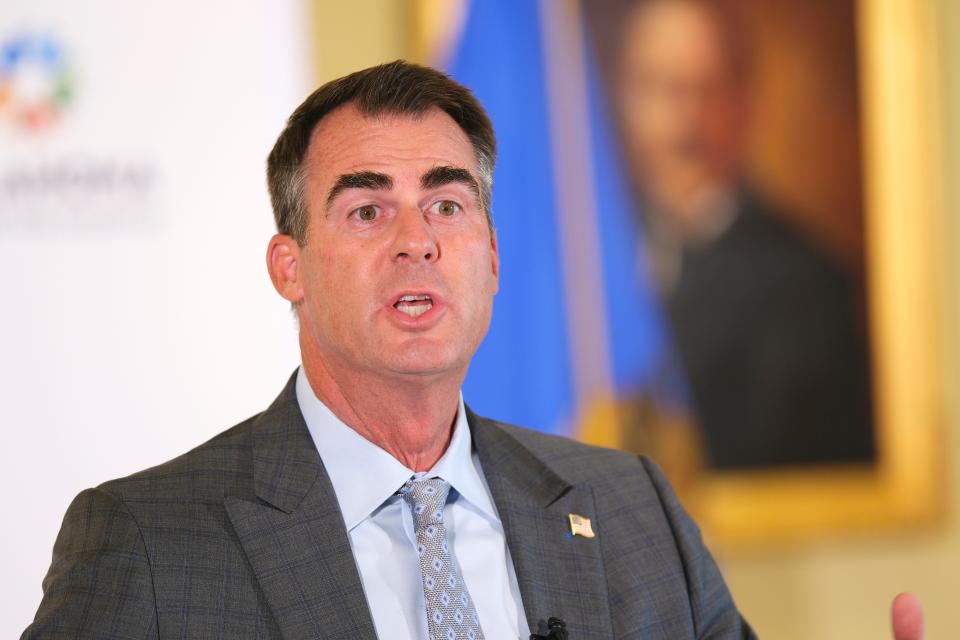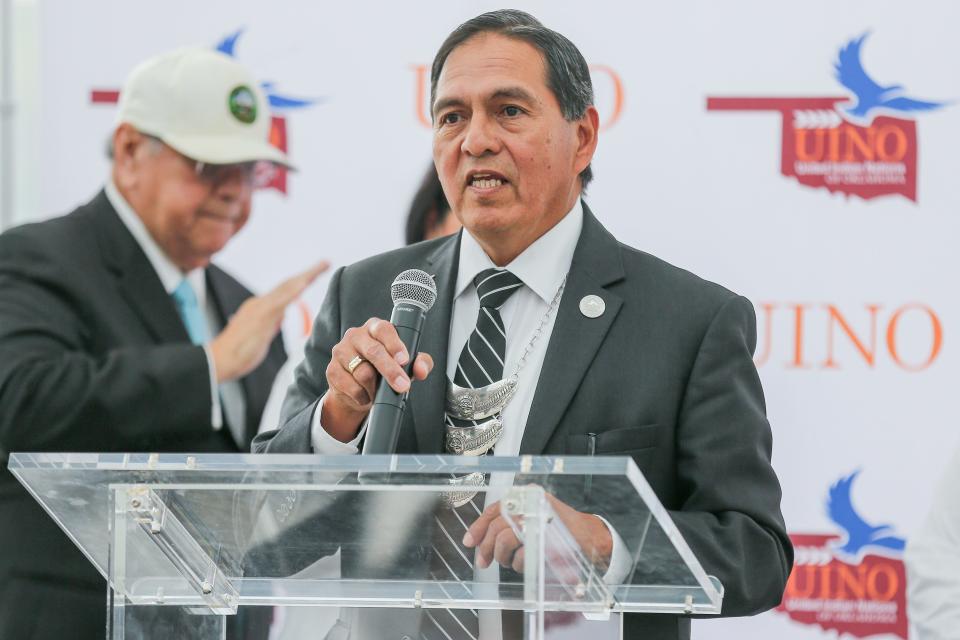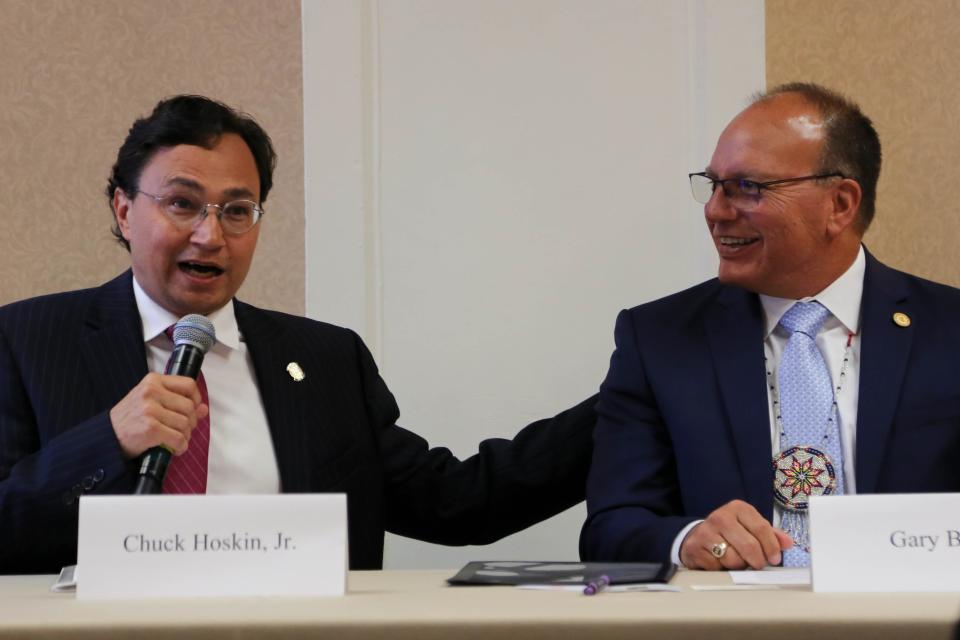Oklahoma governor taps new Native affairs liaison as criticism from tribal leaders grows
- Oops!Something went wrong.Please try again later.
- Oops!Something went wrong.Please try again later.
Oklahoma Gov. Kevin Stitt has appointed a new Native American affairs liaison as criticism mounts over his handling of tribal relations.
Stitt said he believes former Cherokee Nation council member Wes Nofire is an “ideal choice” to help “build bridges between my office and tribal governments.”
The gulf between Stitt and tribal leaders has existed for years but recently widened after the governor delivered a State of the State address that drew widespread criticism from tribal leaders and citizens. In the speech, Stitt questioned the standing of tribal governments and described the impacts of the Supreme Court’s McGirt v. Oklahoma decision as a “storm of injustice.”
Nofire will now take on the task of trying to improve relations between the governor’s office and the 39 tribes based in Oklahoma.
David Hill, the principal chief of the Muscogee Nation, said he doesn’t believe staffing has ever been the problem preventing the governor from having constructive talks with tribal nations.
“The governor sets the direction for his administration and he has made it clear that his policy is hostility towards tribes and their authority,” Hill said in a statement. “It’s hard to see one staff appointment changing that.”
The Muscogee Nation is at the center of the 2020 McGirt ruling, which found the tribe’s eastern Oklahoma reservation still exists. Lower courts have ruled the same to be true for seven other reservations.
More: Oklahoma court affirms Ottawa, Peoria reservations still exist
States generally lack power over tribal citizens on tribal lands. Stitt has made pushing back against any loss of state authority after the McGirt decision one of his main focuses, particularly in recent months. Nofire has also publicly questioned the impact of the ruling on Oklahoma.
“Throughout his career, Wes has advocated for fairness for all Oklahomans and has fought against systems that seek to treat people differently based on race or heritage,” Stitt said in a statement about Nofire’s appointment.
In a letter sent to Stitt on Friday, Hill called on the governor to start working with tribes to find a way forward, instead of opposing them in public remarks and legal fights. He described Stitt’s Aug. 24 State of the State address as a “new low” that could foster hostility toward tribal citizens.
“These lies will perpetuate hostility that will be felt on individual levels and directed toward tribal citizens,” Hill wrote in the letter, provided to The Oklahoman.
Stitt has not yet responded to Hill’s letter. But Abegail Cave, a spokesperson for the governor’s office, said Stitt “remains hopeful that the Muscogee (Creek) Nation will engage in meaningful and respectful dialogue about continued fallout associated with the McGirt decision.”

A history of tension between Gov. Kevin Stitt, tribal governments
Nofire's appointment was announced in a statement sent to the media midday Monday. He will become Oklahoma’s first standalone liaison for Native American affairs in more than three years. Lisa Johnson Billy, a former state representative and Chickasaw Nation legislator, resigned from the role in December 2019 over Stitt’s handling of a gaming dispute with tribes.
The governor then tapped Secretary of State Brian Bingman to handle Native American affairs in addition to his other roles. Bingman did not return a request for comment left with his assistant regarding what role he will hold in future state-tribal relations. Cave later said Bingman would continue to serve as Secretary of Native American Affairs.
More: Supreme Court denies Tulsa's request to halt ticket ruling
Under Oklahoma law, Nofire will help carry out the governor’s office duties in working with tribes, including by monitoring all compact negotiations.
Compacts have been a hot-button issue during Stitt’s time in office. The most recent dispute has focused on tobacco tax and vehicle registration agreements that were nearly expired. Lawmakers met several times throughout the summer to extend the deals for one year over Stitt’s objections. The governor immediately asked the Supreme Court to strike down the extensions. The case is pending.
The liaison role was created after lawmakers dissolved the Oklahoma Indian Affairs Commission in 2011. Nofire will have the power to track how state agencies collaborate and consult with tribal nations and must also publish an annual report about those interactions.
Nofire supported Stitt’s reelection bid in 2022 and has run in the past for higher political offices himself. Most recently, he led an unsuccessful bid to upset the incumbent Cherokee Nation principal chief, Chuck Hoskin Jr. Stitt, a fellow Cherokee Nation citizen, offered Nofire his verbal support in the June race, although voting records show the governor ultimately did not register to cast a ballot.
Hoskin described Nofire's appointment as Oklahoma's new Native American affairs liaison as disappointing and said he did not see how relations with tribes would improve with Nofire at the helm.
“We continue to hope for a day in which the depths of knowledge of Indian Country issues on Governor Stitt’s team deepens,” Hoskin said. “It’s now shallower.”
Stitt has said repeatedly, including at his Aug. 24 State of the State speech to the Tulsa Regional Chamber, that he opposes tribal reservations because he is trying to ensure state law applies equally to every Oklahoman.
But many of the governor’s sharpest criticisms from the speech are untrue, Hill wrote in his letter to the governor.

As one example, Hill pointed to the governor’s assertion about the price of tribal vehicle tags: “Every time you see a tribal tag, just realize the state is losing about $200 million in revenue annually,” Stitt said in his speech.
The comment “is not only inaccurate,” Hill wrote, “but it could result in physical confrontations against innocent tribal citizens for no other reason than having a tribal tag on their vehicle.”
More: Oklahoma Turnpike Authority losing millions as it converts toll booths to PlatePay
Cave did not provide specific figures, but said the $200 million amount is a “conservative estimate” of the money the state misses out on when tribal citizens register and license their vehicles through their tribal governments. “The reality is that the state of Oklahoma may actually be losing more,” she said.
Hill, who helps lead a tribal government advocacy group and is seeking a second term in office as his tribe’s top elected official, said Stitt should view tribal jurisdiction “as an opportunity, not a zero-sum game.”
“Your words give the perception that you wish tribes don’t exist,” Hill wrote to Stitt, “but we do and will continue to do so.”

Hoskin and Choctaw Nation Chief Gary Batton also addressed the ongoing tensions with the governor's office in separate State of the Nation speeches over Labor Day weekend.
Batton said his government believes in “collaborating with legislators to do what’s best for all Oklahomans” and thanked state lawmakers for working with tribes to address shared issues. The Oklahoma Legislature convened several times throughout the summer to extend state-tribal tobacco tax and vehicle registration compacts after Stitt vetoed the bills.
“We’ve had our fair share of challenges from the governor, but the numbers don’t lie,” Batton added, referring to the tribes’ significant economic impact.
More: Oklahoma governor challenges tribal compacts in court after override vote
Hoskin called out “enemies of sovereignty” and pledged to defend the rights of tribal nations wherever necessary — in courts, in Congress, at the Oklahoma Capitol or within local towns.
“In the coming year, the opponents of tribal sovereignty will continue to press their tired old case to move this country backward, to retreat from justice and to push the United States to escape its obligations to the Cherokee people,” Hoskin said in his speech. “But we will meet their insistence on turning back the clock with a greater commitment to moving this country forward.
Editor's note: This story has been updated to clarify that Gov. Kevin Stitt did not register to vote in the Cherokee Nation elections.
Read more:
As courts mull McGirt impact, Oklahoma's governor ramps up rhetoric against tribal governments
Legislature can renew tribal compacts without Stitt, lawmakers tell Oklahoma Supreme Court
Seven things to know about Oklahoma's newest tribal compact dispute
Molly Young covers Indigenous affairs. Reach her at mollyyoung@gannett.com or 405-347-3534.
This article originally appeared on Oklahoman: Gov. Stitt appoints Native affairs liaison as criticism grows

